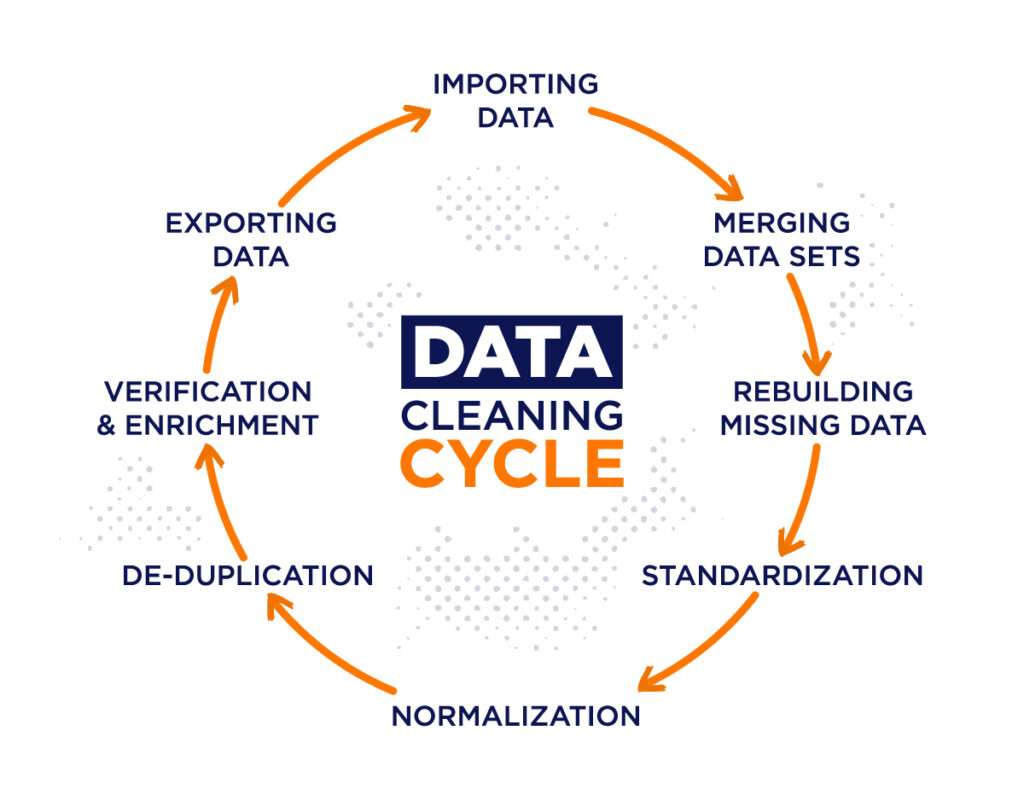Data Cleansing Services | B2B Data Cleansing Solutions – Sk Web Global Pvt Ltd

Trusted and real-time data cleansing to help you navigate through the without losing business.
We all know that for data to be relevant, it first needs to be cleansed in a method that includes identifying, correcting, and eliminating inaccuracies or corrupted records from a table or database. It’s important to locate inaccurate, incomplete, and irrelevant data components, and then alter, replace, or remove the offending “bad” data.
When it comes to Marketing or Sales, a lot depends on the information about the influencers or prospects. Hence, data mining, cleansing, and enrichment have always been an integral part of organizational outreach process.
Data cleansing (sometimes referred to as data cleaning or data scrubbing) is the process of detecting and amending corrupt or inaccurate data points from a data set, table, or database. These are replaced, modified, merged, or deleted.
Data Cleaning
Data cleaning is the process of identifying, deleting, and/or replacing inconsistent or incorrect information from the database. This technique ensures high quality of processed data and minimizes the risk of wrong or inaccurate conclusions. As such, it is the foundational part of data science.
The standard data cleaning process consists of the following stages:
Importing Data
Merging data sets
Rebuilding missing data
Standardization
Normalization
Deduplication
Verification & enrichment
Exporting data
Everyone intuitively understands the premise of data cleaning.
It’s a pretty straightforward idea – In order to get the best possible results out of your data, you need to make sure it’s clean.
But what is “clean” data?
Clean data is a piece of information that meets the requirements of quality data and will contribute to uncovering valuable business insights.
Fortunately, there is a consensus as to what can be considered “clean” quality data.
Let’s take a look at what properties quality data consists of:
Accuracy. Measured by a degree of compatibility between the data in question and an outside data source. It is our “true value” or a “golden standard.”
Completeness. The degree to which all required measures are known.
Consistency. It relates to the degree of compatibility of the databases across the whole system.
Relevancy. The degree of “usefulness” of data, determining how closely a piece of information is related to an issue you’re researching
Validity. The degree to which data in question conforms to defined rules or constraints, e.g., information containing dates, should fall within a specific numerical range.
Timeliness. Most data loses relevance pretty quickly, so this parameter is related to how “fresh” and up-to-date a piece of information is.
Benefits of Data Cleaning.
So you know what happens when you neglect the data cleaning stage.
But what are the upsides of cleaning your data?
- Saved time and money – Inaccurate data leads to business strategies based on false assumptions. Data cleaning saves your company from potentially wasting both time and money, developing an ineffective strategy.
- Increased productivity – Effective data cleansing leads to consistent and highly functional databases. No errors mean faster, more effective workflows, which directly impacts productivity.
- Improved business results – Data cleaning is the key to a properly functioning data analytics solution. Whenever these two things occur, you can expect
- Better decision-making – There is a direct correlation between clean, quality data and reliable business insights: the cleaner the former, the more abundant the latter.
- Maintained reputation – Bad business decisions cost more than money. If you make a decision based on inaccurate data, it makes you look bad and unprofessional. But when your insights are useful, people will notice, and your reputation will grow.
Just like stale food- stale data can hit the best of your marketing strategies. Think about it.
Data is the real breather in these times. As a business rethink your data strategy by means of data cleansing and focusing on sales which will eventually lead to profitability/profitability growth. Organizations claiming hefty valuations just on the basis of sales growth will no longer find buyers – focus on good data and profit growth will be the new normal. Data and IT security have become even more important for businesses. With the help of good data, you will not find it difficult to survive leading to optimization and efficiency.
This is the time to leverage remote working capabilities of your team because you seldom have an option right now. Stay invested strongly in your business continuity and resilience measures. Make your data your top priority and avoid falling into the zone of bad data or decayed data.
Finally, why do you precisely need data-cleansing?

Increased efficiency
With enhanced data quality, you’ll be able to get the maximum ROI, resulting in increased efficiency. Data quality in particular has a direct relationship with how data is collected and organized across departments.

Effective Decision Making
Accurate insights from real-time and on-location data allows a business to fine tune their strategies or tactics right away to take advantage of an opportunity or avert a crisis.

Improved cost
Having only relevant, consistent data reduces storage space which will in turn minimize cost for the business. Maintaining data centres, servers and/or databases may not always be in budget. You can always improvise on cost and meet your marketing targets effectively.

Accelerated Sales Performance
Sales performance is one of the most measured constraints, good quality data allows sales consultants and other B2B users to follow quality leads and reduce time wastage following prospects. Good data also also measures the most valuable customers so that reward programmes can be tailored around those customers.
For any specific data concerns, get in touch with our data experts immediately at: info@skwebglobal.com